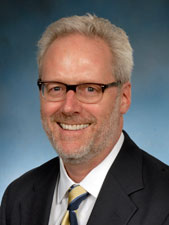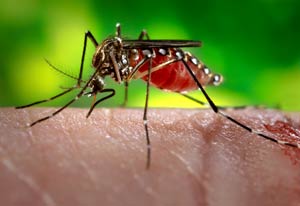Q and A with world-renowned malaria research expert Dr Chris Plowe
May / June 2015 | Volume 14, Issue 3

Christopher V. Plowe, M.D., M.P.H.
Dr. Christopher Plowe is a world-renowned expert in malaria research. For more than 25 years, he has drawn support from NIH, including a long-standing Fogarty training grant to develop malaria research capacity in Mali. He founded and directs the University of Maryland School of Medicine's new Institute for Global Health, which will incorporate the school's Center for Malaria Research and Center for Vaccine Development. He has received a Doris Duke Distinguished Clinical Scientist Award and the Bailey K. Ashford Medal for distinguished work in tropical medicine. He is also a Howard Hughes Medical Institute investigator, focused on accelerating the translation of genomics into health interventions, and is the 2015 president of the American Society of Tropical Medicine and Hygiene.
What are the most pressing questions in malaria treatment and diagnostics?
For one, what to do when we have untreatable malaria. In western Cambodia, there's malaria that's resistant not only to the artemisinin drugs but to some partner drugs. While we're still able to use a different artemisinin-based combination therapy, we're pretty close to having untreatable malaria. And so we desperately need new drugs with different mechanisms of action and of resistance. For another, we badly need ultrasensitive and robust tests to diagnose low levels of malaria infection in rural Africa and Asia. There's perhaps much more malaria than we imagined in asymptomatic people and if we want to eliminate the disease, we must eliminate all malaria parasites, not just those causing fever at a given time. We must also diagnose and treat fevers caused by other pathogens, because as malaria gets less common, more people coming to a clinic with fever will have something other than malaria.
Why is resistance not a problem in Africa and what is the risk?
We do see some of the mutations in a resistance gene for artemisinin resistance at low frequencies in Africa. We know now that they've been occurring for at least 15 years in Mali, for example. So these mutations appeared before artemisinin was ever used in that part of the world, and they kind of pop up here and there but they don't ever really become very frequent. We suspect that the reason for this is that the resistant parasites have a fitness disadvantage. For instance, Africa has a lot of people with partial immunity that allows them to be infected but not have any symptoms and therefore not be taking any drugs, then when there's not so much drug around the resistant parasites will be outcompeted by their more fit sensitive cousins.
What are about treatment for particularly difficult cases, such as cerebral malaria?
We have pretty good drugs to treat cerebral malaria, treat malaria in pregnancy - the same drugs by and large that we use to treat uncomplicated malaria. What we need in cerebral malaria in particular is other adjunctive treatments. So, for example, Terrie Taylor [Dr. Terrie Ellen Taylor, NIH grantee including Fogarty], an NIH-funded scientist working in Malawi, has come up with some very interesting evidence of the mechanisms of how kids die from cerebral malaria, and it may be that just ventilating children when they become extremely ill with cerebral malaria could get them through that danger period and allow the antimalarial drugs time to act. So some of the non-pharmacological treatments may be promising.
What hope comes from genomics?
We and others are beginning to harness the power of the genomic revolution in ways that are directly relevant to malaria elimination. We've done genome-wide association studies that have helped pinpoint the molecular marker of artemisinin resistance that has now led to tools for surveillance. And we're working on approaches to analyze the genomes of parasites in vaccine trials, with the hope we can better understand the need for multi-strain vaccines to protect against genetically diverse parasites and potentially identify new targets for malaria vaccines by finding out which genes in the parasite are under selection by vaccine-induced immunity.
Until recently, the strategy against drug resistant malaria has been to try to contain it and prevent it from spreading. But some of the genomic studies show that when you see the same resistance mutation in two places, there are some instances of resistance spreading, for example, between Cambodia and southern Vietnam. But there are other cases of completely independent emergence of the same mutations, for example, in Myanmar. If there's resistance popping up independently, you can't expect to put up a firewall and block it; you have to eliminate malaria from the entire region. The WHO is now shifting their recommendation from a containment strategy to total elimination of malaria in the greater Mekong subregion. It will take a lot of resources, coordination and collaboration across borders and across sectors. A big part of malaria elimination is going to be political will, where we're working with many partners in Myanmar to try to build and sustain political will for a national malaria elimination campaign as part of a regional malaria elimination campaign.
What is the outlook for a malaria vaccine?
We'll have a licensed malaria vaccine relatively soon. It has significant protective efficacy, but not nearly as high as we would like, so one approach is to improve its immunogenicity and/or add additional malaria antigens to make an expanded multistage, multicomponent vaccine. The other approach is a whole organism vaccine. Early clinical trials in the U.S. giving people a whole organism vaccine and then challenging them with the same strain of parasite have shown up to 100 percent protection. Now the big question is, will this work in the field where we have many different genetic variances of parasite? Those studies are happening now in Mali and being planned in Burkina Faso.

Photo by CDC/James Gathany
New drugs, new vaccines and new approaches are needed
to achieve global malaria eradication.
If and when can malaria be eradicated worldwide?
One of the more optimistic predictions I have heard is from Bill Gates at the American Society of Tropical Medicine and Hygiene meeting a few months ago. He said he would like to see malaria eradicated in his lifetime. The feeling is that this is possible, if we have very effective new tools, for instance if we have a highly efficacious malaria vaccine that gives long-lasting protection after a single immunization. Because we have to struggle not only with the malaria parasite but with the social and economic and political situations in which malaria parasites thrive, it will be very difficult to achieve global malaria eradication with our current tools - we really need some new drugs, new vaccines, new approaches.
What is the state of capacity in endemic areas?
Malaria research capacity is very strong in some lower-and middle-income countries, Mali being a great example of that. Over 25 years, the Malaria Research and Training Center there has become one of the world's leading research institutions bar none. Their investigators are independently competing for grants from NIH and the European Union and it's a very strong program. We'd like to see that happen in other countries including, for example, in Myanmar, where there's a very strong culture of research and very good lab capacity. For highly sensitive tests to diagnose very low levels of malaria, molecular test and for genotyping the resistance genes, we don't think that we should be shipping samples off to the United States or United Kingdom for analyses. We are working very hard with our partners in Myanmar to establish the ability to do these kinds of research assays and to develop new research tools in the country with their scientists in their labs.
If we want to eliminate malaria everywhere, eventually eradicate it, we must have stronger research capacity in many more places. We have to make the case to the funders as well as local governments that we'll eliminate malaria only by building up research capacity in the malaria endemic areas. Part of that has to do with the science and the need to have scientists engaged in the field who understand the important questions driving the research agenda. But another component involves generating and sustaining political will. If scientists in countries where malaria elimination is moving forward simply collect samples and send them off to the U.S. or Europe, they and their leaders will be a lot less motivated to sustain the support for malaria elimination than if they've built up their own capacity, if they're the ones collecting and analyzing and interpreting the evidence for where, when and how to deploy malaria elimination interventions. That's what it's going to take in the long run.
More Information
To view Adobe PDF files,
download current, free accessible plug-ins from Adobe's website.
Related Global Health Research Topics